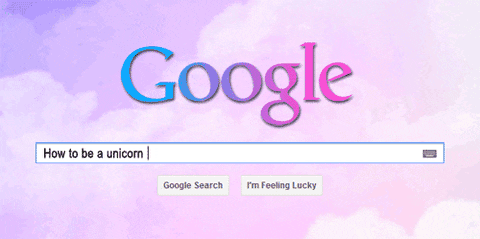This essay originally was published on June 17, 2021, with the email subject line CT No. 86: "MUM and the ideal search result."
What's your ideal search result?
I chew on this question with clients quite often: what do you actually want potential customers and readers to see when they search for your brand name? For a specific term your audience uses?
If you were to "own" the search engine results page (SERP) for that term, what would it look like? What types of content would it contain and how would they be designed? If there were an answer box at the top, what would it say? How would it be formatted?
I ask my clients to think about these questions not because any one company has much control over the SERP, which is an automated response for most non-controversial queries.* I ask because the simple consideration of the question shifts power to a more human-centered place: what if you could have more control over the results of what an algorithm serves up for you? What if it weren't about ranking and competition and instead about considering how your brand appears to others?
Visualizing the ideal search result enables stakeholders to see that there are other ways to consider our current technology, as well as consider that there are other ways to arrive at a brand's website and thought leadership beyond the homepage.
It's also a solid conversation starter: if you could edit the lynchpin of contemporary epistemology, how would you rearrange it? What features would you make more transparent, and which would you keep opaque? How do your proposed changes benefit, attract or impact your audience?
I start with these queries because that's how I think about search. If I were in the room at Google, if I wanted to be in the room, how would I shape the conversation about what search should be?
*As shown with COVID-19 information, Google can step in and design search results manually without much difficulty.
The mountains of assumptions and the future of search
When I consider how I would change search, absolutely none of my answers would involve niche global travel hobbies available only the wealthiest and workiest among us, those who could literally pay someone else to research information instead of halfassing a query with a search engine. But instead, Google's head of search Prabhakar Raghavan's I/O presentation on the future of search poses the most frou frou question in the most awkward way imaginable, just to demonstrate how his company's new search product might work:

We're going to completely ignore the comma splice and run-on sentence that would make my fourth-grade English teacher cringe and instead consider its content:
An American mountain has been hiked and now the querent wishes to conquer another mountain in another country. The querent, entitled, assumes that the clause "I've hiked Mt. Adams*" is universally understood as a singular experience that needs no further description, and assumes there will be no challenges to the assertion that "I am hiking Mt Fuji in the fall."
If one asked this question to a person, you would likely receive follow up questions like, "What was your experience on Mount Adams like?" or "What made you choose Mt. Fuji? What is it about the fall that makes you so set on hiking then?" or even "What kind of physical shape are you in? Are you going to the summit of Mt. Fuji or just a leisurely jaunt around the bottom?" A good conversationalist as well as an expert would dive deeper into the query before providing an answer, because, well, expert consultants tend to answer complex questions like this one with: "It depends."
Google, meanwhile, dives right into an answer. Obviously the big Goog can help you accomplish your mountain climbing task with paramount efficiency, without any pesky follow-up questions. Google helps you conquer all kinds of material challenges with simple knowledge because who needs additional context besides a SERP?
In Raghavan's demonstration, the MultiTask Unified Model (MUM) technology then separates the query into "fitness training for the terrain" and "hiking gear for fall weather," providing results from translated websites across languages, maps, images and modules extracted from websites. Image search is included in the results too, so you can figure out whether or not you have to buy more hiking boots. Its ideal result: A SERP that combines different content types, all of which are processed by different algorithms, into one unified expert search result.
Google's ideal results for its proposed hiking query comprise:
- Search results from websites in multiple languages that connect entity knowledge across cultures, so that all 50 Inuit words for snow equal the English and Japanese and Russian words for snow, and whenever someone Googles "snow" all the Google translated results for that snow entity appear instead come up
- Image and video search results that correctly identify the cross-cultural entities of Snow and Mountain and Weather and Boots without difficulty
- Geographic mapping and weather data
- Shopping results, of course, because the internet is a mall and without ecommerce, search is just a library
**I had to Google Mt. Adams, btw, because I've never been to Washington or even lived remotely near decently sized mountains.
Presenting answers to questions that no one asks
Google's aim with MUM is appears to be a search Esperanto, so that anyone anywhere can search in any language and find facts upon facts upon how-tos upon products to buy. Since they own 93% of the global search market, a completely ridiculous majority of mindshare that makes Rupert Murdoch and other media moguls lose sleep on the reg, they can ultimately implement this unified vision— and they don't have to ask their audience or even look at audience data to determine whether such innovation is desired.
One of my frustrations with the tech industry in the 2020s is that, despite its insistence on mining our personal details, the conception, marketing and "innovation" of new products from large companies sometimes has very little to do with what users actually need or ask for. Product changes aren't developed in response to user needs, but rather driven by continued growth and the concept of universal tech adoption, which is different than user problem-solving. Private industry is not a democracy, and users have no say in why or how the technology they've been given has changed.
Because if Google had looked at what people are actually searching to prepare their presentation, based on the queries that people use in their decades-worth of their presentation, the complex query in their presentation would represent something more like these extremely common queries:
- whats is global warming [sic]- 595,000 monthly searches globally
- what is communication - 225,000 monthly searches globally
- how to sell drugs online fast - 159,000 monthly searches globally
- how to do a sex - 135,000 monthly searches globally
- how to jailbreak a firestick - 99,200 monthly searches globally
- how help anxiety - 17,000 monthly searches globally (approximately equal to the current monthly searches of the term "Mt Adams," in case you're wondering)
And so on. I could go on for days with all the seemingly simple but truly complex queries that people repeatedly type into Google, the types of queries that Google should be visualizing the answers for if they are to position themselves as the universal organizers of the world's information.
Not that I need Raghavan to tell me "how to do a sex" but, y'know, give me something more complex than a California rich dude's international mountain hiking hobby. I'd like to see MUM's answer for the extremely complex query "what is communication" that goes deeper than a dictionary definition.
People search for questions not easily answered in corporate slide decks
People search to find details that they don't want to ask other people in real life. They search for clarity, for more information about subjects that are confusing and difficult to answer. They also search for illegal or ethically questionable activities, for terms they hear their peers say, for conceptually ambiguous words whose connotations go far beyond the set of words attached to a definition. They search for horrible, horrible things, or ideas that take a while to process. They search for health care answers when it's too expensive to go to a doctor.
Google, as the company that defined the contemporary search system and harnessed immense amount of market data from the search behavior, has a responsibility to present their product in terms of consumer need.
Instead we are again shuffled into the tech presentation world of hyperbole and overpromising, the one that requires the yes and... thinking of improvisational comedy to make any practical sense of the content we're being served, the one that assumes that the audience knows nothing of how tech works and will listen, enraptured, to any idea that approaches an "AI."
In Raghavan's explanation, MUM can extract "rich insights" from its "deep knowledge of the world." It is "1000x more powerful" than the existing language parsing algorithm BERT, he says, although I don't know how "powerful" is calculated here. Is the dataset larger? Processing more energy?
Never mind that much of Google's current "deep knowledge" is literally text that has been structured to be read more easily because Google's algorithms spend so much time parsing truth and trust, they need businesses to enter their opening hours in a specific format or else that content will never be indexed or cataloged. Never mind that the "rich insights" described in the presentation don't fit the definition of "insights" at all; they're just the same facts presented in a different context.
Google's demonstration of MUM was the kind of presentation that makes tech nerds excitedly shimmy in their seats just thinking about the possibilities, that inspires cub tech reporters use phrases like "sentient" to describe it in headlines, and that motivates audience analysts like me to scream, "Who the fuck would ever ask this question in the first place, and why do they get to define information access for 93% of the world?"
For a company with so much access to consumer behavior and cultural trends, it boggles my mind that Google's ideal query for a demonstration of supposedly revolutionary new technology is "I have the time, money and capacity to climb two mountains... for my hobby. How can I do it?"
Natural language processing and generation are not actually very good
Longtime readers of this newsletter know that I think Google's organic search index is a remarkable innovation, and I give them kudos (probably too much) for making something that universally makes information more findable and accessible outside mass communications channels. Truly, the networked search Google developed is revolutionary, and the fact that little indie media punks like me can cobble out a decent living working with it, well, *chef's kiss.*
But let's be realistic about Google's stated aims and how they align with current capabilities: Google's natural language processing capabilities are among the best on the market—and are still nowhere near the technical level they should be to make complex results good for normal users' queries. The entire mechanism is still just a giant 3D spreadsheet that connects like with like, predicated on established behavioral trends.
Search is drawn from massive language, image and video datasets combined with predictive analytics and indirect user testing through Chrome. Direct feedback, the mechanism that determines whether search results are good or not, is only ever sought from low-paid search results raters and not directly included in the search processing algorithm. Natural language processing and generation models not even close to sentience or "artificial intelligence." NLP and NLG are phenomenally complex but are still do not actually generate new speech patterns or know vocabulary words that are not statistically common. NLG or any automated system in 2021 cannot produce insights or new ideas—which is why Google's autocomplete feature pushes users toward semantically related queries based on predictive analytics instead of the most authoritative queries about a particular topic.***
Google believes its search product is at Daedalus labyrinth status, that it no longer has to address what its audiences actually need and are asking for, like far more inclusive natural language models and more transparency around algorithmic components. But anyone who uses search to navigate the information, trust and content mines knows there are minotaurs aplenty in search as it is, and a system like MUM does absolutely nothing to placate them. With more languages, cultural nuance and trust signals to sort, MUM gives the monsters of misinformation even more power.
In visualizing an Esperanto result to organic search queries, Google actively ignores calls for transparency in search results, disregards legitimate critique of its natural language processing technology, and skips right over the crucial part of the internet and SEO ecosystem that is identifying and rectifying misinformation.
Esperanto was a failed experiment because it assumes we all want a universal experience and a universal language, and literally all of world history in the century and a half since Esperanto's conception disproves its viability. In my city, in many cities, across the world, people are actively and rightly pushing back against the idea of a universal experience. Why Google thinks it can create some kind of universal virtual space—aka SERPs—is beyond me.
***Someday soon: why you should never keyword research based solely on autocomplete because it's bad data and not in any way the whole stories.
What's your ideal search result?
Knowing that mountain climbing and Esperanto are now where Google wants to go, return to the question of ideals and search results: when you are looking for technology and innovation in these post-pandemic days, what exactly do you want to find? And how can you shape the information you're presenting to represent that ideal result?
Because we need more people considering their own ideal result, operating within the current limitations of technology and human capacity, closing the gulf between the mountain-climbing technovisionaries and all us plebes Googling on the ground and trying to eke out a normal, functional life.
Related links
- Timnit Gehru's work on identifying biases within AI systems – and Google's rejection of it – in Wired (paywall, but well worth your click)
- Google's blog post about MUM
- The race to understand the exhilarating, dangerous world of language AI by Karen Hao, and featuring one of the best plain-language explanations I've seen of predictive language tech, in the MIT Tech Review (also a paywall)
- The problem with featured snippets, aka Google's One True Answer on Search Engine Land
Hand-picked related content







